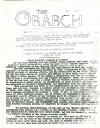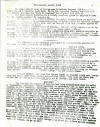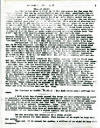


THE ORARCH
905 Central Square Bldg., Cambridge, Mass.
No. 7
APR 1940
Subscription $1 a year, 50¢ for 6 months. For discussion groups, each additional copy per month above the first fully paid year's subscription, 25¢ per year.
Issued by the Boston Liberty Group. This paper is issued by a group, and is not the property of any individual.
Contributions of news or articles are welcomed.
"GRANT TO OTHERS ALL RIGHTS YOU WOULD HAVE OTHERS GRANT TO YOU."
______________
WHICH DOCTRINE―CANNING OR MONROE?
We have been hearing from the present administration some queer and unprecedented things masquerading under the name of the
"Monroe Doctrine," things having no resemblance to the original policy entitled back in 1823.
The real precedent for what the New Deal chooses to call the "Monroe Doctrine" is really the Canning doctrine of 1829. Canning was at that time the British minister of foreign affairs, and his proposition to the United States was one for joint action of American and Britain to keep South America out of the hands of other powers. It was really a proposition that the two nations join to form a protectorate over the Western Hemisphere, under the protection of the British navy, and with a policy that no Western Hemisphere territory be transferred to other powers. No recognition of South America's independence was suggested in Canning's proposition, and apparently none was intended.
This proposition was taken up for consideration by the Monroe administration, and rejected. Instead, a contrary policy was outlined by the Secretary of State, John Quincy Adams. The Adams policy was embodied in President
Monroe's message to Congress on December 2, 1823. It was, to recognize the independence of South American nations, and to protect all independent nations in this hemisphere against efforts of any European power to colonise or take possession or bring any of these independent nations into Europe's "system" of alliance and balance of power. It further proposed no interference with existing colonies of European powers, and emphasized that America must never participate in wars between European nations or interfere in Europe's internal affairs in any way.
The present administration, in the name of the "Monroe Doctrine," is announcing what amounts to a revival of the Canning Doctrine, which the Monroe administration rejected most emphatically. And its war-mongering pro-allying is a defiant flouting of the Monroe Doctrine itself.
When the "Monroe Doctrine" is spoken of, this part is all too often forgotten: "In the wars of the European Powers in matters relating to themselves we have never taken any part, nor does it
comport with our policy so to do." This may have been violated in 1917; does one
breach demand another?
It might almost seem as though our President learned his Monroe Doctrine out of a Canadian text book. It is the rejected Canning Doctrine pure and simple, and has the "Made in England" label stuck all over it
The real Monroe Doctrine is a fairly complete guide to America's best bet in foreign policy. It amounts to:
FOR INDEPENDENT AMERICAN NATIONS: Recognise independence as acquired and protect it against occupation or colonisation by European powers.
Independent American nations must not be brought into the European system of alliances or balance power.
FOR AMERICAN DEPENDENCIES OR EUROPEAN POWERS: United States not to interfere until they establish themselves as independent nations.
FOR EUROPEAN NATIONS: Friendly relations with all, whether republic or tyranny. Recognize whatever happens to be the de facto government, and do not interfere in their
internal affairs. No participation in wars between European powers, nor in their system of alliances or balance of power.
"The alternative to minority government is not majority government. The true popular government is neither."―Raymond
Moley
And, in case the above quotation should be puzzling, let us explain that a popular government (as Mr. Moley chooses to designate it) limits the powers of the
"ins" so as to protect individuals and minorities against the tyranny of the majority. This type of limitation is what we designate as Orarchy. Get
used to thinking in terms of Orarchy, not Democracy.
______________
"Which kind of democracy is preferable? The kind which permits equality to swallow freedom, through ultimate usurpation of centralised control by a dictator who
debauches democratic processes through manipulation of the
"plebiscital" referendum? Or the kind which, while recognising the inevitable trend toward centralised power, yet cherishes freedom sufficiently to balance that power?"―"Uncle Dudley" in the Boston Globe.
We would answer, not even the latter kind; an orarchy could not "recognise the inevitable trend toward centralised power," but must so limit the rights and powers of governmental rule as to prevent any such trend.
______________
SPY HUNT
The Federal Department of Justice has just established what it calls a "Neutrality Laws Unit," whose business is apparently not as much with neutrality as with
sedition, espionage, and sabotage; in other words, it is a heresy-hunting organisation designed to hound and punish savagely all who disagree with the administration. Dictatorship is well on its way when a thing like that can find its way into this country; but there seems to have been no lack of the kind of traitors who, in the name of "democracy," supported
fanatically a European government which hung up some sort of new record in the
number of people shot for opposing the government's political views; and it is the same kind of traitors who are now trying to
seek out and punish "sedition and treason" here. And, as for the hue and cry lately circulating against
"sabotage," it smells strongly of the Soviet cry against
"wreckers," and of the standards that rate a bit of machinery far above any number of human lives.
If there are indeed people who deliberately interfere with the kind of activity that would enable this country to
butt into a war against other countries, then it might seem as the surface as though they were doing a fine thing by helping to preserve the peace
of America. There may be a law against them―but why? And why the moral indignation about it, unless we are anxious, above all things, to go to war?
______________
PRIMARY SEASON
Candidates are getting lined up in the semifinals for the race for the
Presidency. The two so-called Parties are just that―semifinals
for coming elections, not mutual organisations for the promotion of principles
or political beliefs. Voters are simply lined up with little regard for any
classification of their political beliefs. In the semifinals, the two winners
racing against each other is the final election. This system of election has
never grown up in any country except the United States, where it is so firmly
established that it is impossible to use the "Parties" for any other
purpose, and the "Party Platforms" are mere trading off which
binds nobody and which nobody takes seriously. Political campaigning for certain
principles is usually done by means of other organisations operating within both
"Parties"―not by party organisations themselves, for there is none.
In other words, there is no actual difference, even theoretically, between
Democrats and Republicans, and any effort to create one must necessarily fizzle
out, as witness the President's recent effort to convert the "Democratic
Party" into a New Deal organisation―it just couldn't be done.
Furthermore, in the long run, economic conditions have nothing whatever to
do with politics, and who is elected makes absolutely no never-mind from that
angle; depressions will come and go regardless. Any pretense otherwise is merely
the kind of oratory that is considered necessary to bunco the public while the
excitement is up, and that is true irrespective of whether a candidate calls
himself Democrat, Republican, Socialist, Communist, or anything else. Even
did he mean well, the job he is seeking will not enable him to be of any help.
Probably the main issues in the coming campaign will be third term and
war. American tradition is very much against giving anyone too much power;
the First Republic made the office of President almost an honorary one, with a
one-year term and the constitutional provision that no one could be President
for more than three years in any six. The overthrow of that government resulted
in a presidency with much more power, and no limitations as to tenure of office
in the new constitution; so the people developed an eight-year limitation to
correspond with the former three year limit. This is one of the important
bulwarks that America has reared against dictatorship, and it will face
considerable attack. Also, the war-mongering of the present administration is
bound to come under fire during the campaign; will their new "Neutrality
Unit" be used to arrest stump speakers who point these things out? Of
course, these issues may be avoided if no third-term candidacy developes; but on
that, it is unsafe to predict, and the third-termites are meaner termites and
more dangerous ones now than ever.
______________
The Province of Quebec, in Canada, has just voted equal suffrage for women.
______________
A bill which has already passed the House of Representatives is aimed at putting a serious crimp in the institution of "administrative justice," a dictatorial institution which crept into this country from Europe some time ago, but ran hog-wild during the New Deal," whereby a politically-appointed bureaucrat acts as accuser, prosecutor, judge, jury, witnesses, and executioner all in one. The main trouble with this legislation is that it does not really exterminate this type of institution which is so hostile to the maintenance of the individual's rights against the government.
______________
Two men watching the operation of a steam shovel:
"If it weren't for that shovel, five hundred of us might be busy with our
spades."
"Yes; and, if it weren't for spades, a million of us might be busy with
teaspoons."